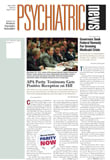Since Alzheimer’s disease ravages human memory, it’s hardly surprising that the brain’s major memory center—the hippocampus—has been found to be smaller than normal in Alzheimer’s patients (Psychiatric News, September 1, 2000). But how about major depression? Memory loss is not a prominent symptom of this disorder. Still, an abnormally small hippocampus appears to be involved in major depression as well.
In 1999, for instance, Yvette Sheline, M.D., an associate professor of psychiatry at Washington University, and colleagues reported that women who had experienced recurrent major depression had hippocampi that were smaller than normal. And now abnormally small hippocampi have been noted in persons experiencing a first episode of major depression.
This new finding, from psychiatrist Thomas Frodl, M.D., and colleagues from the psychiatry and radiology departments at Ludwig-Maximilians University in Munich, Germany, is reported in the July American Journal of Psychiatry.
Frodl and his coworkers recruited 30 patients with a first episode of major depression for their study. Psychiatric diagnoses based on DSM-IV criteria were determined by a consensus of at least two psychiatrists. The average time that the subjects had had their depression was nine months. For comparison, 30 healthy subjects were matched in a one-to-one fashion with respect to age (mean age 40 years), gender, education, daily alcohol consumption, and other factors.
Frodl and his team then took pictures of the 60 subjects’ hippocampi with high-resolution magnetic resonance imaging and then compared the findings for the depressed subjects with those for the control subjects.
Male depressed subjects had significantly smaller hippocampi total volumes and hippocampal gray matter volumes than the control subjects did, the researchers found. And both male and female depressed subjects showed significant reductions in hippocampal white matter compared with the control subjects.
So if abnormally small hippocampal architecture is implicated in depression, what actual role is it playing? As Alan Schatzberg, M.D., chair of psychiatry at Stanford University School of Medicine, pointed out in an accompanying editorial, “The fact that [this latest] study involved first-episode patients suggests that a smaller hippocampus, particularly in men, is a risk factor for, rather than a consequence of, major depression.” Frodl and his team agree. As they wrote in their study report, the “findings support the hypothesis that the hippocampus and its connections within limbic-cortical networks may play a crucial role in the pathogenesis of major depression.”
And if a smaller hippocampus plays a causal rather than consequential role in depression, how did the hippocampus become abnormally small in the first place? One possibility is stressful life events. After all, stressful life events are well known to be capable of triggering depression; animal studies have linked prolonged stress with a smaller hippocampus, and persons with posttraumatic stress syndrome have a smaller hippocampus than normal (Psychiatric News, May 19, 2000). In fact, Frodl and his coworkers went so far in their study report to suggest that stressful events early in a person’s life might impair the hippocampus and that this damage might then predispose the individual to depression later in life.
Still another possibility, Schatzberg pointed out in his editorial, is that a smaller hippocampus results from inheritance, not stressful life events. Several studies point to a strong genetic influence on hippocampal volume. For instance, Schatzberg and his colleagues explored, in monkeys, the relative contributions of early life stress and genetics to hippocampal size in young adulthood. Genes—not early stress—appeared to account for much of the variance in hippocampal size.
The study by Frodl and his team was financed by the German Federal Research Ministry.
Am J Psychiatry 2002 159 1112
